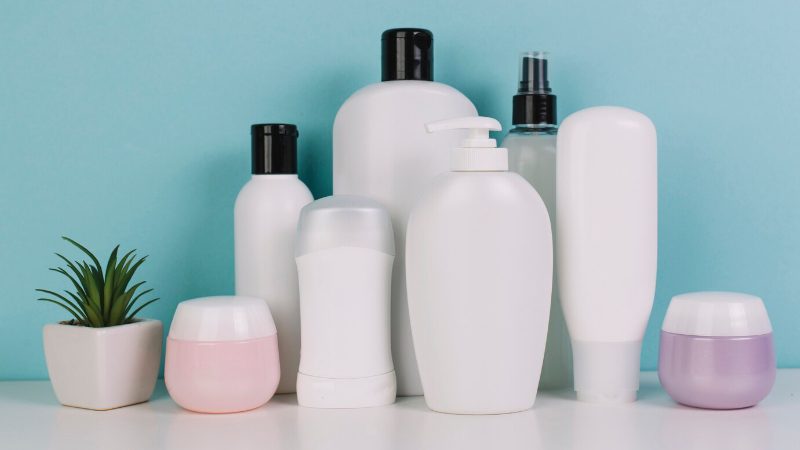Harnessing the huge potential of biotechnology for new, sustainable and cost-effective production of high-value cosmetic ingredients has become a reality.
Background
Customers demand highly effective and safe cosmetic ingredients, which must be fully bio-based, vegan and environmentally friendly. While traditional approaches uses either chemical synthesis or are depleting natural resources, biotechnology opens the door to new opportunities for both customers and the cosmetic industry.
Technology (Examples)
- Vegan cholesterol from acib-yeasts allow for smooth skin protection and reduction of wrinkles without a greasy feeling and avoiding any potential customer or NGO criticism associated with the use of animal-derived ingredients.
- Cyanoflan is a high-value bio-based carbohydrate polymer exhibiting anti-inflammatory, antioxidant, skin-regeneration and stabilizer/thickener features all at once. It is produced naturally from CO2 by microalgae using an acib-process.
- Peptides are key signaling molecules or important building blocks for our skin, stimulating the production of elastin, collagen and other proteins regenerating and protecting the skin. acib has developed microorganisms for the sustainable production of natural peptides, without the need of traditional synthesis using hazardous chemicals.
- Tertiary alcohols can be used as denaturant, odor enhancers or disinfectants. Since, especially longer-chain, tertiary alcohols are costly and difficult to obtain by traditional methods, acib offers enzymes to convert simple fatty acids into natural secondary or tertiary alcohols.
- Functional sugar molecules can be produced by acib’s technology: Glucosylglycerol is an anti-aging molecule, stimulates cell renewal and reduces sunburns, propanediol-glucoside is an emollient and humectant. Cellodextrins can replace microplastics as scrubbing agents, siallyllactose and other human milk oligosaccharide are used for skin-moisturizing and skin-brightening, and nucleosides can possibly counter skin-aging by stimulation of collagen production.
- Antioxidants fight harmful free radicals, but low (bio-)availabilities and high production costs can hamper their use. acib has developed enzymatic pathways for the production of natural antioxidants e.g. nothofagin (from rooibos) or 3-hydroxytyrosol (from olives), but has also increased the potency e.g. by bio-based resveratrol derivatives such as stilbenes and methoxy stilbenes exhibiting even higher antioxidants capacity and has also found ways to increase water solubility of resveratrol 1700-fold by enzymatic glycosylation. acib has also developed processes for vitamin C derivatives (AA2G) to be more stable towards temperature, oxygen and sunlight.
- Squalene/Squalane is a valuable natural moisturizer that imparts a smooth and soft touch to the skin, but its main source shark liver (animal cruelty/non-vegan) sometimes impedes its use in lotions and creams. acib’s yeast technology allows for an alternative, bio-based and sustainable production of squalene/squalane.
- Fragrances can be produced with acib’s microbial cell factories and/or enzymes. In previous industrial collaborations we’ve developed novel routes to lilial/lysmeral, piperonal/heliotropin, monoterpenols such as (iso)borneol, ambrein, nootkatone, etc. and we’re eager to develop better routes with and for you!
- Enzymes can also be ingredients themselves from proteases for exfoliation and reduction of skin imperfections to superoxide dismutase (SOD) for anti-aging, and cell-health, lysozyme and others for anti-bacterial effects, oxidases as preservatives since they use up oxygen and sugars to produce gluconic acid and hydrogen peroxide to increase shelf life and many more …
Project Offer
acib offers to develop new biocatalytic routes and/or production strains for the cosmetic ingredient of your choice. IP developed in such projects can be fully transferred to you as our investor/industrial partner.
Experts:
Prof. Dr. Bernd Nidetzky, Prof. Dr. Robert Kourist, Prof. Dr. Harald Pichler, Dr. Margit Winkler, Dr. Anita Emmerstorfer-Augustin, Dr. Christiane Luley, Dr. Tamara Wriessnegger, Dr. Rita MotaDevelopment status:
TRL 2-6IPR:
IP can be generated and transferred to you as our project partner.Keywords:
Vegan, Natural, Cholesterol, Cosmetics, Skincare
Image by Freepik

